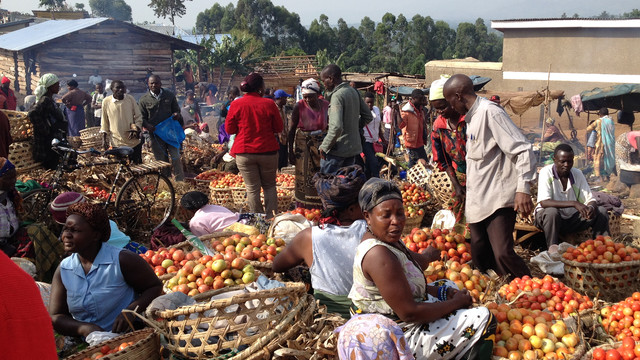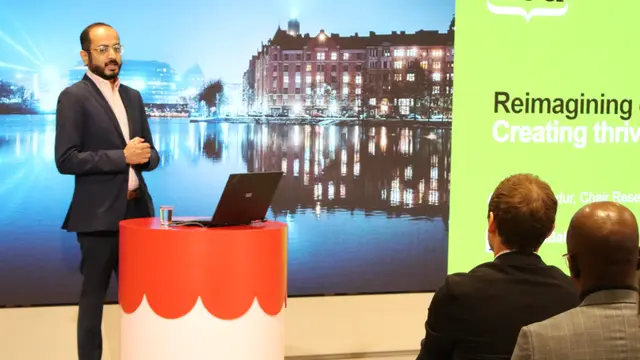Defining and scoping an SDG evaluation: how do you get started? – second episode of podcast mini-series
In the second episode of podcast mini-series ‘Sustainable Development Goals – Evaluating progress for a brighter future’, Dirk Hoffmann and Nataly Salas Rodríguez from DEval host two discussions, one in English and one in Spanish, about how an SDG evaluation is done.
Sustainable development is every country’s goal. How they achieve it isn’t always straightforward.
Evaluating progress against the 17 Sustainable Development Goals (SDGs) and their multiple targets is complex. Few countries have done a formal evaluation but where they have, they have learnt lessons that could be shared with others.
Getting started is key: defining the scope and focus of the evaluation can sometimes be a major challenge. But in this second podcast episode, Dirk Hoffmann and Nataly Salas Rodríguez from the German Institute for Development Evaluation (DEval), consider examples from the global North and global South: Finland and Costa Rica.
Defining an SDG evaluation
In this episode of the mini-series 'Sustainable Development Goals: evaluating progress for a brighter future', guests from research, practice and government backgrounds discuss what an ‘SDG evaluation’ actually means and the importance of judging progress against a range of objectives and principles – set by the 2030 Agenda – rather than an advance against one target only.
In the English-language episode Gonzalo Hernández Licona, from the International Initiative for Impact Evaluation (3ie), stresses the value of making sure the SDG evaluation connects to a country’s policy cycle. This is the case even if, as Satu Lähteenoja of Demos Helsinki points out, this means prioritising its focus, possibly to the top five sustainability concerns, as Finland did, to make the process more manageable and cost-effective.
Both speakers agree that a principal challenge of any SDG evaluation is to manage the breadth of what is reviewed. And as such, we might ask whether an evaluation is worth it, particularly when almost every country has signed up to the process of voluntary national reporting – or VNR for short.
That’s where the objective nature of an SDG evaluation comes in and Carolina Zúñiga Zamora, of Mideplan (Ministry for National Planning and Economic Policy) in Costa Rica, highlights how her country found an SDG evaluation can raise questions and challenges for the VNR, strengthening it in the process. In turn, the VNR enables priorities to be identified for the evaluation itself.
The Spanish-language episode focuses on the case of Costa Rica – a world leader in climate and biodiversity policies – which produced its SDG evaluation in 2020.
Ericka Valerio, evaluation commissioner from Mideplan, Costa Rica and Victoria Sánchez, a lead evaluator from Red2Red, share insights, both celebrating the government’s interest throughout the process and marking it as key to the success of the evaluation. Several different actors and stakeholders, as well as the limitations posed by the pandemic, were some of the challenges they encountered.
International evaluation expert Ada Ocampo discusses the ‘Evaluation to connect national priorities with the SDGs’ guide, which informs steps involved in scoping, designing and conducting an SDG evaluation to support local or national journeys towards sustainable development.

Expert views
The episode 2 participants are:
English episode:
Carolina Zúñiga Zamora is a sociologist with 10 years’ experience in social sciences and evaluation within the field of international cooperation and the public sector. She has been an analyst in the evaluation unit for the Ministry of National Planning and Economic Policy of Costa Rica since 2018.
Satu Lähteenoja is a senior expert on sustainable development at the independent think tank Demos Helsinki. She has 15 years of experience in accelerating sustainability transitions at national, city and company level. Her expertise includes the SDGs and their integration into strategic leadership at different levels of society.
Gonzalo Hernández Licona, senior research fellow at the International Initiative for Impact Evaluation (3ie), is based in Mexico. He has extensive experience of country-led evaluations of progress of social and poverty-reduction policies at national, state and municipality levels.
Dirk Hoffmann joined DEval in November 2019. He is part of the evaluation capacity development team implementing the Focelac+ project (link in Spanish), and focuses on SDG evaluations. His experience encompasses climate change adaptation, protected area management and international climate policy.

Spanish episode:
Ericka Valerio is an evaluation commissioner of Mideplan in Costa Rica. She is an economist with 10 years of experience in the field of evaluation and is technical coordinator of the evaluation of non-reimbursable international cooperation in biodiversity and climate change.
Victoria Sánchez is vice-president of the Spanish company Red2Red (link in Spanish) and has 25 years of experience in public sector consulting, especially in the evaluation of public interventions at different levels. She has extensive experience in Latin America, where she has conducted evaluations for international and multilateral organisations.
Ada Ocampo is president of IDEAS International (International Development Evaluation Association). She is a Peruvian sociologist with a master's degree in development planning and management. She has worked for UNICEF, UNDP, UNFPA and FIDA. She is co-founder of the International Organization for Cooperation in Evaluation (IOCE) and the Latin-American and Caribbean Monitoring, Evaluation and Systematization Network (ReLAC) (link in Spanish).
Nataly Salas Rodríguez is a social psychologist with a master's degree in evaluation of development programmes and projects. She has worked for the UNHCR, the judicial branch of Costa Rica and as an independent evaluation consultant. She currently works as a specialist in capacity development in evaluation for the DEval’s Focelac+ (Fomento de Capacidades en Evaluación en Latinoamérica) project.
Additional material
- Download the guide 'Evaluation to connect national priorities with the SDGs'
- Listen to the first episode of the mini-series 'Adaptive evaluation: considering climate risks in theory and practice'
- Effective evaluation for the Sustainable Development Goals
Subscribe
You can subscribe to the podcast on your favourite podcast app as follows:
The podcast is also available on IIED's YouTube channel.
Further listening

Listen to our Make Change Happen podcast, which provides informal insights into IIED’s work to create positive change and make the complex issues we face more accessible to wider audiences.
 Soundcloud
Soundcloud Stitcher
Stitcher TuneIn
TuneIn Spotify
Spotify

